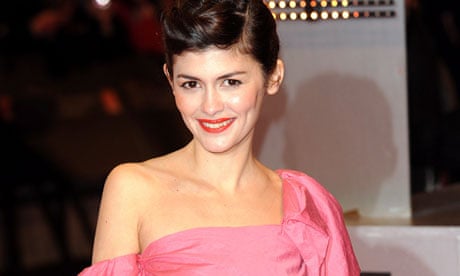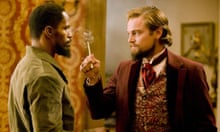For someone as shy and discreet as Audrey Tautou, the next few weeks will be feel uncomfortably like putting her head above the parapet again, exposed to potshots from her Gallic critics.
On the other hand her British fans, who remember her as the pixie-faced heroine of The Fabulous Destiny of Amélie Poulain, one of the most successful French films of all time, can look forward to a feast after the famine.
Next month the film Thérèse Desqueyroux, an adaptation of the François Mauriac 1927 classic released in France last November, in which Tautou plays the title role of a repressed wife who poisons her domineering, misogynistic husband, will open in British cinemas.
Around the same time, Tautou will confront her instinct to run away from the limelight, having agreed to be maîtresse de cérémonie at the 66th Cannes Film Festival.
Such an honour suggests Tautou has finally made it on to the list of French cinema's national treasures, headed by Catherine Deneuve. Whether it is enough to stop the barbs from French critics, who have never forgiven Tautou for becoming a star on the back of the hugely successful Amélie, is another question.
Thierry Chèze of the monthly movie magazine Studio Ciné Live told the Observer: "Ordinary people love Audrey, but what you might call the 'intellectual' press hated Amélie and demolished the film. Because she was its symbol, its star, it demolished Audrey too.
"There was a section of the French media that just didn't understand how or why Amélie was such a success. The fact that it and she were so commercially successful just made things worse and she got hit even harder. It was intellectual snobbery."
In the 12 years since Amélie's release, Tautou has had difficulty shaking off the innocent, naive and meddlesome girl from Montmartre who came out with lines like: "At least you're not a vegetable – even artichokes have hearts".
As the American critic Anthony Lane wrote in his New Yorker review of her performance in the 2009 film Coco Before Chanel: "The problem for Audrey Tautou is that she is doomed to trail clouds of 'Amélie' wherever she goes. Those inky round eyes and that pixie mug insure that hers are the features, poor thing, that social anthropologists will eternally reach for when asked to illustrate the term gamine. Or mignonne."
Playing Tom Hanks's sidekick in the populist but hugely successful The Da Vinci Code did little to soften critical hard-hearts in France.
On learning that Tautou, 36, had been chosen to open and close the Cannes Film Festival, the centre-left Nouvel Observateur dismissed Amélie as "unwatchable" and The Da Vinci Code as a "tragic turkey". The magazine hinted that Tautou had slightly redeemed herself with her role in Cédric Klapisch's 2002 L'Auberge Espagnole – which grossed just under $30m worldwide, compared with just under $174m for Amélie — and admitted she might redeem herself further with her role in Oscar-winning Michel Gondry's adaptation of Boris Vian's novel L'Ecume des jours, released in France in 10 days.
However, it added waspishly: "In accepting the role as maîtresse de cérémonie and presenting herself in more ambitious films, we might hope the second half of Tautou's career might flourish away from mediocrity: to be more precious, rare and unique."
No wonder Tautou has long held an ambivalent attitude towards her chosen career.
She grew up in rural Auvergne in south-central France and decided she liked acting after her father, a dental surgeon, and mother, a teacher – who named her after Audrey Hepburn – sent her on a summer course at the renowned Cours Florent theatre school in Paris as a reward for passing her baccalaureate with honours.
The young Tautou, however, was more interested in painting and drawing, subjects her parents doubted would lead to gainful employment.
Instead she was encouraged to study literature at the Sorbonne. After graduating, she considered a career studying primates, but gave herself one year "and not a day more" to make it as an actress. "I thought, 'I don't want to keep doing this job, if this job doesn't want me'. I didn't want to spend all my life waiting for the phone to ring and living in a 10 square metres apartment. No, no, no. There are too many other wonderful things to do in life," she once said.
In that year she was cast in the gentle comedy Venus Beauty, about a young beautician who falls in love with a much older pilot who is badly scarred from burns. Her performance earned her a César award, much to her surprise. "I was so certain I could not be chosen that I thought they had dialled a wrong number," she said at the time.
The movie caught the eye of Jean-Pierre Jeunet, who was looking for someone to play Amélie after his first choice, the British actress Emily Watson, suddenly became unavailable.
Roles followed in Stephen Frears's Dirty Pretty Things, The Da Vinci Code, Coco Before Chanel and Beautiful Lies, directed by Pierre Salvadori, with whom Tautou worked in the 2006 comedy Priceless.
None of the roles, nor her appointment as the face of Chanel No 5, appears to have done much to boost her confidence or make her less of a shrinking violet. In a 2011 interview she said: "A few months ago, I watched one of my old movies and I thought to myself, 'Oh, Jesus!' Thank God that at the point I made that film I didn't realise the extent to which I was terrible. Oh, mon dieu!
"I say to myself, does it simply mean that if in another 10 years I re-watch the films I am making today I will say, 'Oh mon dieu, how terrible I was then'."
After The Da Vinci Code, Tautou decided to "calm everything down", walking away from Hollywood, saying it didn't suit her and "wasn't the way I want to live my life". She once described her attitude as being a surfer turning their back on the biggest waves. "I understand that nobody understands me, but I can't be someone I'm not."
With Thérèse Desqueyroux, a lodestone of French literature, Tautou has at last earned grudging respect from French critics for her portrayal of the tortured heroine trapped in a rural marriage of convenience.
French reviewers were less effusive than English-speaking critics like Ed Gibbs of the Sydney Morning Herald, who wrote: "The French elf rarely puts a foot wrong (on home turf, at least). Here, as the fearless, downtrodden wife whose husband's toxic medication finally offers a way out, she's in her element."
The French were kinder to her than they had been for a long time. Even Le Nouvel Observateur admitted that the role had given her a chance to "create a character of a complexity and blackness unusual for her (Tautou)". The TF1 film critic wrote that Tautou had evolved by seeking "more ambiguous roles than she had been used to", adding: "We hope her performance will be noticed by the profession that could perhaps give her a César. It would be amply merited."
The César never came, but Tautou told Femina magazine that she had "adored" playing Thérèse: "She's not a rebel, she obeys, but that gives her depth. I just had a bit of difficulty playing jealous, because I find that feeling rather shameful."
She added: "What I have in common with her is being quite obedient, even if I admire rebels. Thérèse sees things around her with a lot of distance, she analyses all the familiar conventions, that hypocrisy, the hidden violence that is omnipresent. I understood her so well that it wasn't hard to play her."
Chèze said that presenting Cannes will be much more of a challenge for the actress. "It won't be an easy exercise for Audrey, as she's discreet and introverted by nature. She won't like it, but I think she said yes because, after all, everyone has to confront their fears and there's (Steven) Spielberg heading the jury this year, so it's a huge honour."
He added: "She will probably always be remembered as Amélie; it's just one of those things. And whatever people thought of the film, it made Audrey an international star."




Comments (…)
Sign in or create your Guardian account to join the discussion